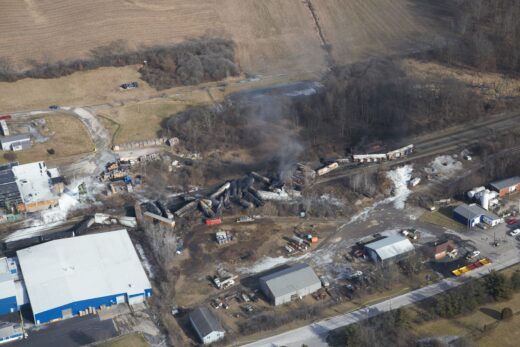Spotlight PA is an independent, nonpartisan newsroom powered by The Philadelphia Inquirer in partnership with PennLive/The Patriot-News, TribLIVE/Pittsburgh Tribune-Review, and WITF Public Media. Sign up for our free newsletters.
By Stephen Caruso | Spotlight PA

Credit: NTSB
In the wake of a hazardous train derailment less than a mile from the Ohio border, Pennsylvania lawmakers are advancing legislation that supporters say would improve safety standards and increase corporate accountability.
But the legislation already faces quiet resistance from the industry and its allies, who have questioned the legality of the proposed measure. State regulators, meanwhile, are uncertain about their capacity to enforce its requirements.
The measure was introduced a few weeks after a 1.8-mile-long Norfolk Southern freight train derailed in East Palestine, Ohio, and spilled 100,000 gallons of hazardous chemicals. The spill caused mass evacuations and raised concerns about potential harm to people and the environment.
The bill’s opponents, including the Pennsylvania Chamber of Business and Industry, argue the proposed rules would burden business’ logistics and be preempted by federal law, according to an opposition letter the chamber sent to state lawmakers.
“While state appellate courts have found past expansions of state-level rail safety regulation to be preempted under [federal law], left unresolved, the potential conflicts between [the bill] and these federal statutes could result in disruptions to operations in the state for the movement of goods and products necessary to sustain the economy,” the state chamber wrote to lawmakers.
However, lawmakers from both parties in the narrowly Democratic-controlled state House rejected that argument, passing the bill 141-62 last week. It includes provisions that would restrict train length, mandate two-person train crews, and create a database of hazardous materials crossing the state by rail.
“We can’t wait for federal regulations which always seemed to be in the works but never quite get done, or for federal laws that will never ever see the light of day,” bill sponsor and state Rep. Rob Matzie (D., Beaver) said on the state House floor. “We are the people’s house, ladies and gentlemen. That is who we serve. It’s time for extraordinary action.”
The bill, also sponsored by state Rep. Jim Marshall (R., Beaver), would:
• Require freight trains have at least a two-person crew. Railroad workers say this is a common practice, but not a fixed rule, and legislation would prevent companies from implementing one-person crews.
• Prohibit freight trains longer than 8,500 feet.
• Allow union officials to accompany government inspectors and monitor compliance with laws and regulations without interference from a company.
• Create a reporting system for emergency responders that would detail the hazardous materials being transported by train through the commonwealth. The database would not be subject to the state’s open records law.
• Fine rail companies $10,000 if a train blocks an emergency vehicle at a crossing for 10 minutes or more.
Pennsylvania’s proposed rules would apply only to “Class I” railroads, a federal designation for companies that earn over $900 million in revenue each year. The two Class I’s with active freight lines in Pennsylvania are Norfolk Southern and CSX.
Are Pa. regulators up to the task?
The state Public Utility Commission would enforce the rules and could fine companies up to $25,000 for noncompliance.
Whether the commission is up to the task is a separate question.
At a late May state Senate Democratic policy hearing on railroad safety, PUC Vice Chair Stephen DeFrank argued his agency lacks the authority to enforce rules outside of those regulating railroad crossings.
“Unfortunately, you know, a lot of this is preempted by the federal government and interstate commerce,” DeFrank told senators, citing a PUC legal review. (DeFrank is a former lobbyist who had Norfolk Southern as a client, according to state records.)
However, Larry Mann, an attorney who helped write a 1970 federal law regulating railroads and has represented railroad unions, disagreed. He argued that federal law preempts state law only on specific topics covered by existing rules.
“If the Federal Railroad Administration has not regulated a subject matter, the states are free to do that,” Mann said.
So in areas where the federal government is silent, such as train length, states can write their own laws, Mann told Spotlight PA. He also said that state train inspectors should consider increasing checks of how trains are assembled at yards.
Such increased oversight might not be feasible with the PUC’s current limited resources. According to DeFrank, the commission has just eight inspectors to cover 5,600 miles of railroad track.
While the commission is looking to add rail inspectors, their starting salary of $45,000 is the third lowest in the country among state-employed rail inspectors, making recruitment and retention difficult.
To address that, the commission would need the state Civil Service Commission to approve higher salaries. DeFrank told state Senate Democrats that PUC has been working with the Shapiro administration and is “hoping to get some relief with that.”
A spokesperson for Democratic Gov. Josh Shapiro’s administration did not answer specific questions about the bill or PUC salaries, but pointed to a letter the governor sent to Norfolk Southern in February in which Shapiro pledged to hold the company accountable.
Railroads’ long lobbying history
In the late 1800s, lobbyists for the Pennsylvania Railroad, one of the largest companies in the world at the time, were known as the commonwealth’s 51st senator. That company no longer exists, but the rail industry still holds sway in Harrisburg.
In the past five years, Class I rail companies, as well as the Keystone State Railroad Association, which represents 29 railroads of varying sizes including Norfolk Southern and CSX, have spent $2.6 million on lobbyists, public relations campaigns, and gifts to influence the Pennsylvania legislature, according to state records.
Norfolk Southern and CSX have also spent another $215,000 on campaign donations. About three-quarters of that money came from Norfolk Southern.
Both companies have supported lawmakers statewide from both major parties. All told, 85 different state lawmakers or political action committees have received at least one check from either company in the past five years, including Shapiro, his 2022 gubernatorial opponent state Sen. Doug Mastriano (R., Franklin), state Senate President Pro Tempore Kim Ward (R., Westmoreland), and state House Speaker Joanna McClinton (D., Philadelphia).
The checks tended to be relatively small — typically $500 or $1,000 each. Three Capitol insiders told Spotlight PA that this kind of broad giving indicates a lobby aims to get its foot in the door with as many lawmakers as possible in the hopes that they could make a pitch to pass or block legislation.
Paul Pokrowka, a Harrisburg locomotive engineer for Norfolk Southern and member of the labor union SMART, which represents railroad workers, has seen his employer’s influence at work.
He’s lobbied the Pennsylvania General Assembly repeatedly to advance a two-person crew bill since 2015, when state Rep. Martina White (R., Philadelphia) introduced such a proposal.
“If you want to get down to the brass tacks of why did it not advance? Politics. You know, inside baseball politics,” Pokrowka told Spotlight PA.
But he’s seen a change since the East Palestine derailment, as lawmakers have taken notice of renewed public interest in regulating the industry.
“So much goes on that the public has no idea about,” Pokrowka said. “But thankfully, this unfortunate tragedy is opening the eyes of the public and they’re becoming aware of the dangers that are maybe in their backyard.”
Since the wreck, Norfolk Southern has accelerated phasing out older freight cars, as well as providing more industry-funded training and expanded access to information on train loads to first responders, company spokesperson Tom Crosson said in an email.
Crosson said that the company has not taken a position on Matzie and Marshall’s bill. But at least two business organizations that Norfolk Southern is a member of — the state Chamber of Business and Industry as well as the Keystone State Railroad Association — have lobbied against the bill in part or in full.
And in an email to state House Democrats viewed by Spotlight PA, a Norfolk Southern representative told the caucus that the company “shares concerns raised” by both organizations.
“Issues pertaining to rail freight transportation are currently being considered at the federal level, which is a more appropriate jurisdiction for these matters to be addressed,” the email said. “We would ask that the impacts to interstate commerce and one of the most environmentally sensible modes of freight transportation available be considered.”
The bill now heads to the Republican-controlled state Senate for consideration. In past GOP-controlled legislatures, similar proposals languished in committee without a vote.
In a statement, state Sen. Pat Stefano (R., Fayette), whose committee now has the bill, told Spotlight PA that “rail safety is a matter of utmost significance.” However, he also highlighted preemption concerns, saying the committee will “engage in a thoughtful and thorough examination of this measure to ensure any potential changes fall within our state jurisdiction and the parameters of federal law.”
Supporters and opponents of the bill agree on one thing — if it becomes law, railroad companies will likely challenge it in court.
Railroad companies “don’t want the state to regulate anything,” union attorney Mann told Spotlight PA. “They challenge every proposed regulation by any state.”
Spotlight PA’s Kate Huangpu contributed data analysis.
WHILE YOU’RE HERE… If you learned something from this story, pay it forward and become a member of Spotlight PA so someone else can in the future at spotlightpa.org/donate. Spotlight PA is funded by foundationsand readers like you who are committed to accountability journalism that gets results.








